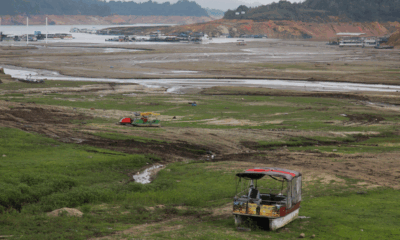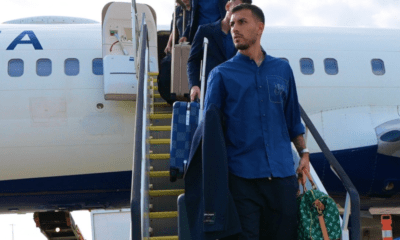INTERNACIONAL
US organization operates one of the last medical clinics in Haitian capital amid spiraling violence
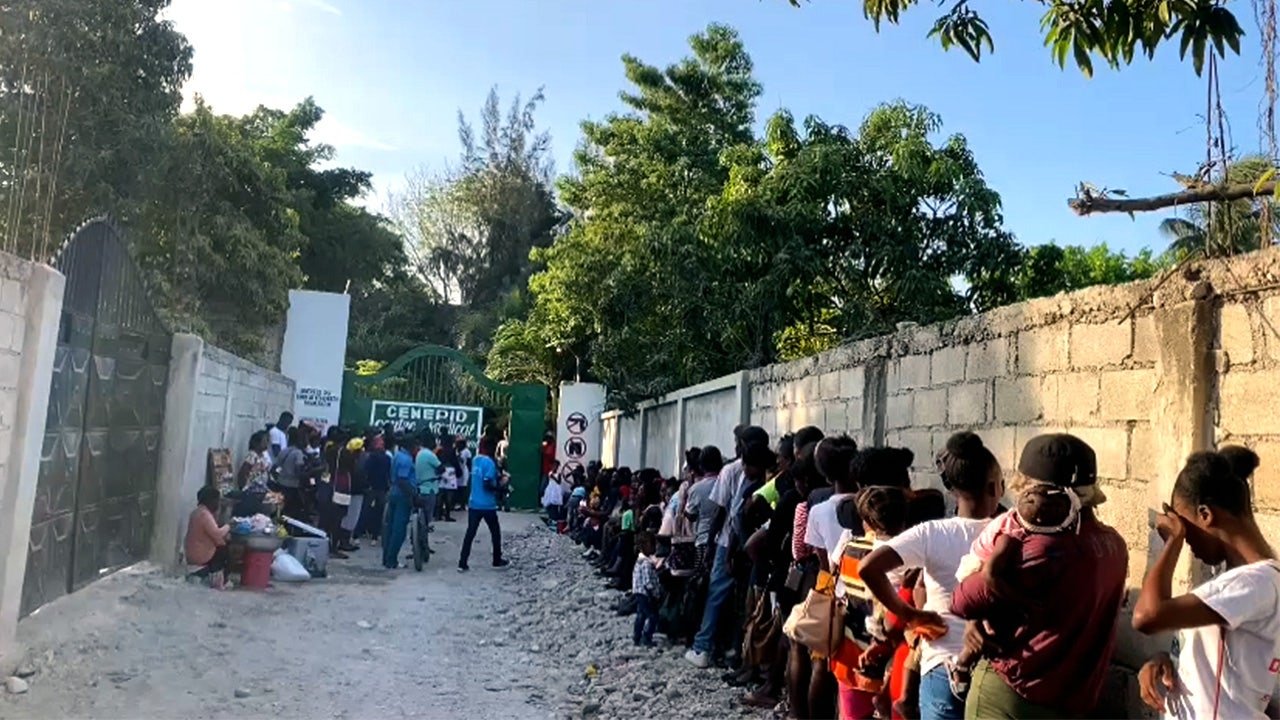
Partners In Development (PID), a nonprofit organization based in Ipswich, Mass., runs one of the few remaining medical clinics in Haiti’s capital city of Port-au-Prince amid ongoing unrest in the country.
Tali Marcelin, the president of PID, told Fox News Digital that their clinic has seen an uptick in patients throughout the past few weeks due to several healthcare facilities closing and other nonprofits pulling out of the area.
Fighting has broken out in Haiti’s capital since late February as gangs have battled police for control of Port-au-Prince. Earlier last month, armed gangs attacked Haiti’s National Penitentiary, releasing nearly 4,000 inmates, and the Croix-des-Bouquets Civil prison, releasing an additional 1,000 plus inmates.
US EVACUATES FIRST AMERICAN CITIZENS FROM PORT-AU-PRINCE AS HAITI CRISIS DEEPENS

The National Penitentiary in downtown Port-au-Prince. The gray building inside the prison is called Titanic and is where the most criminal prisoners are kept. ((Photo by Niels Salomonsen/Edit by Getty Images))
The United Nations estimated last year that 80% of Port-au-Prince is under the control or influence of gangs. Last week, armed groups looted the Delmas 18 Hospital and the Saint Martin Health Center, as well as 10 pharmacies near Haiti’s largest public hospital, according to the United Nations Office for the Coordination of Humanitarian Affairs.
One of the biggest issues PID faces amid the ongoing conflict in the area is keeping the clinic stocked, due to skyrocketing prices for supplies.
Marcelin said they had teams of other people who would travel with them to Haiti, bringing thousands of pounds of medicine, but they aren’t currently able to bring the teams or donated medical supplies, forcing them to buy in-country.
«We’ve run into probably the biggest, not problem, but struggle that we’ve hit now is keeping our lab tests, our supplies and our medicine in the pharmacy just stocked,» she said. «The services are free. The people really need them. There’s not really anywhere else that they can turn to, and not a lot of options of where they can turn to.»
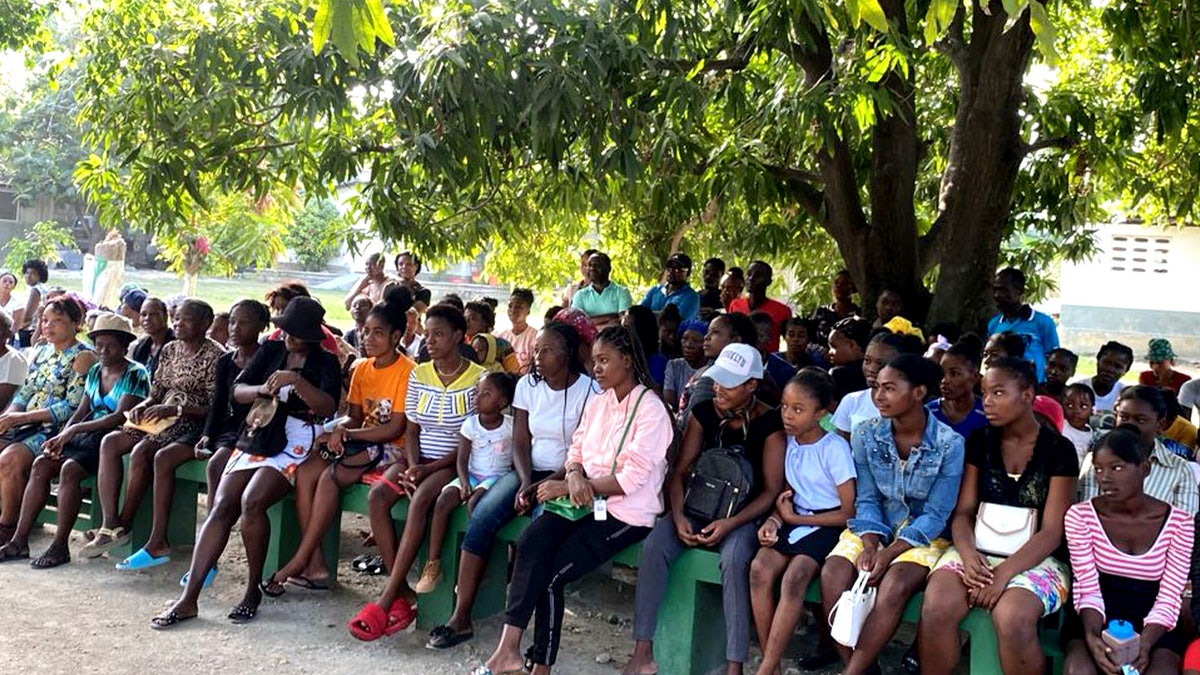
Haitians sit outside. (Tali Marcelin)
«It’s just really hard to keep stuff stocked [up]. We do the best that we can. But sometimes that does mean that, you know, someone gets prescribed something and we just don’t have it on our pharmacy’s shelf, and they have to buy it elsewhere,» Marcelin continued.
«And unfortunately, the people that we’re working with, a lot of them don’t have the money to go buy it, you know, at a pharmacy. So they end up either not getting treated or partial treatment or something like that, which [is] a tough one.»
The clinic is open Monday through Friday from 8 a.m. to roughly 4 p.m. However, they’ve had to close early due to unrest and the sound of gunshots in the area, and sometimes PID’s staff stay overnight to avoid traveling to and from their homes on unsafe roads.
Marcelin estimated that within the past two years, they’ve probably closed their gates for eight or 10 days.
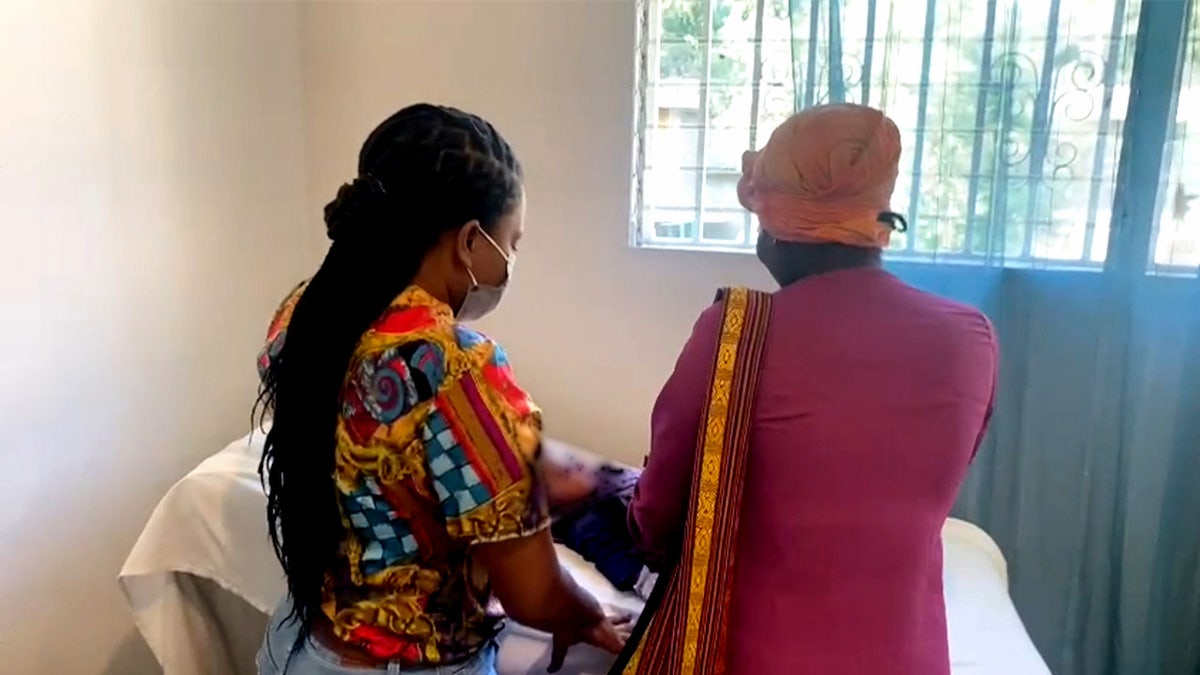
A mother and child visit Partners In Development’s medical clinic. ((Tali Marcelin))
«We usually don’t see a lot of the violence right in where we are, even if it’s in other areas, which we’ve been lucky because of that, but yeah, about two weeks ago, we did have to close for about a day and a half,» she said.
The clinic has roughly 30 full- and part-time staff, a primary care physician, triage nurses, pharmacists and lab technicians. They also provide a range of services from wound and emergency care to pre- and post-natal care.
«There’s always been a great need in Haiti. We’ve been in Haiti long enough to see, you know, we’ve gone through earthquakes and coups and hurricanes and you name it. People are so resilient and they have. . . . I think I always see a lot of hope in the Haitian people. You know, they’re always looking for the future, and they’re hanging on to any bit of hope,» the PID director told Fox News Digital.
More than 53,000 people have fled the Port-au-Prince metropolitan area between March 8 and March 27, according to a report from the U.N.’s International Organization for Migration (IOM).
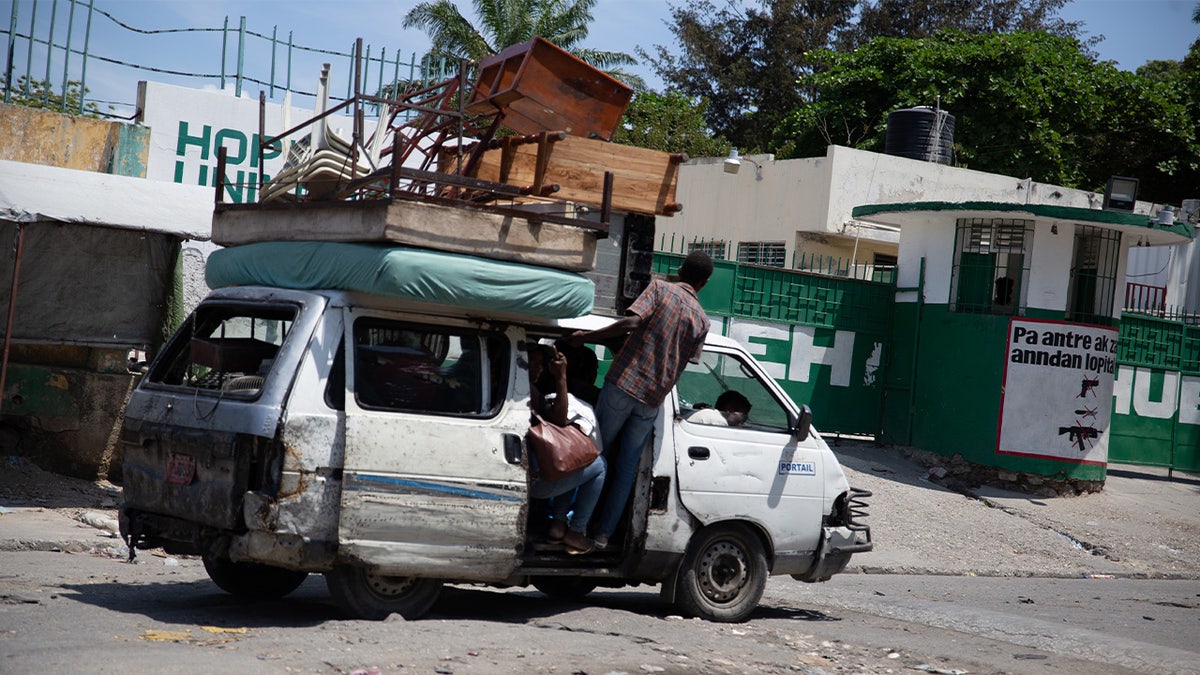
Bus carrying luggage due to gang problem as gangs set fire to several pharmacies, clinics and a few houses in the vicinity of the general hospital in Port-au-Prince, Haiti, on March 26, 2024. (Photo by Guerinault Louis/Anadolu via Getty Images)
«Attacks and generalized insecurity are pushing more and more people to leave the capital to find refuge in provinces, taking the risks of passing through gangs-controlled routes,» the IOM said in its report.
The organization also found that the majority of displaced people fleeing the capital were traveling to southern Haiti, specifically Grande’Anse and Nippes, among other areas.
HAITI WAITS FOR KENYAN POLICE MISSION TO FIGHT GANGS AMID FEARS THEY WON’T COME
The Dominican Republic was the intended final destination of 3% of people, according to the IOM.
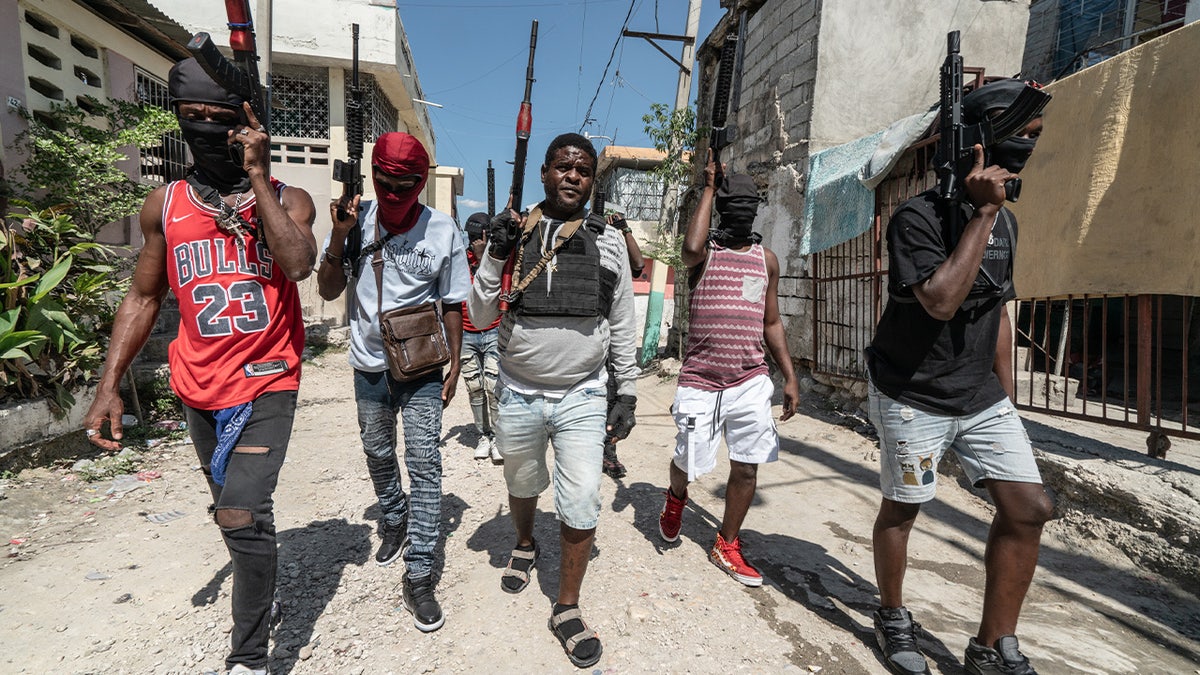
Gang Leader Jimmy ‘Barbecue’ Cherizier patrolling the streets with G-9 federation gang members in the Delmas 3 area on February 22, 2024, in Port-au-Prince, Haiti. ((Photo by Giles Clarke/Getty Images))
PID Haiti Field Director Raymond Niquelson, who has worked with the nonprofit since 1999, told Fox News Digital that the past few weeks in the area haven’t «been so good.»
«People can’t go out of the area, but our clinic is loaded with patients. Some of the patients have to leave and come back the following day because we are too busy,» he said.
CLICK HERE TO GET THE FOX NEWS APP
«Honestly, other places have shut down, and they are not providing services anymore. We are thankful we are able to continue providing services to the people.»
INTERNACIONAL
Death toll climbs to 116 in religious gathering stampede in India

Thousands of people at a religious gathering in India rushed to leave a makeshift tent, setting off a stampede Tuesday that killed more than 100 and left scores injured, officials said.
It was not immediately clear what triggered the panic following an event with a Hindu guru known locally as Bhole Baba. Local news reports cited authorities who said heat and suffocation in the tent could have been a factor. Video of the aftermath showed the structure appeared to have collapsed.
At least 116 people died, most of them women and children, said Prashant Kumar, the director-general of police in northern India’s state of Uttar Pradesh, where the stampede occurred.
AT LEAST 60 DEAD AFTER STAMPEDE AT RELIGIOUS GATHERING IN NORTHERN INDIA
More than 80 others were injured and admitted to hospitals, senior police officer Shalabh Mathur said.
«People started falling one upon another, one upon another. Those who were crushed died. People there pulled them out,» witness Shakuntala Devi told the Press Trust of India news agency.
Relatives wailed in distress as bodies of the dead, placed on stretchers and covered in white sheets, lined the grounds of a local hospital. A bus that arrived there carried more victims, whose bodies were lying on the seats inside.
Deadly stampedes are relatively common around Indian religious festivals, where large crowds gather in small areas with shoddy infrastructure and few safety measures.
Police officer Rajesh Singh said there was likely overcrowding at the event in a village in Hathras district about 220 miles southwest of the state capital, Lucknow.
People mourn next to the bodies of their relatives outside the Sikandrarao hospital in Hathras district about 217 miles southwest of Lucknow, India, Tuesday, July 2, 2024. A stampede among thousands of people at a religious gathering in northern India killed at least 60 and left scores injured, officials said Tuesday, adding that many women and children were among the dead and the toll could rise. (AP Photo)
Initial reports said organizers had permission to host about 5,000 people, but more than 15,000 came for the event by the Hindu preacher, who used to be a police officer in the state before he left his job to give religious sermons. He has led other such gatherings over the last two decades.
Indian Prime Minister Narendra Modi offered condolences to the families of the dead and said the federal government was working with state authorities to ensure the injured received help.
Uttar Pradesh’s chief minister, Yogi Adityanath, called the stampede «heart-wrenching» in a post on X. He said authorities were investigating.
«Look what happened and how many people have lost their lives. Will anyone be accountable?» Rajesh Kumar Jha, a member of parliament, told reporters. He said the stampede was a failure by the state and federal governments to manage large crowds, adding that «people will keep on dying» if authorities do not take safety protocols seriously enough.
In 2013, pilgrims visiting a temple for a popular Hindu festival in central Madhya Pradesh state trampled each other amid fears that a bridge would collapse. At least 115 were crushed to death or died in the river.
CLICK HERE TO GET THE FOX NEWS APP
In 2011, more than 100 Hindu devotees died in a crush at a religious festival in the southern state of Kerala.
-
POLITICA2 días ago
Cristina Kirchner reapareció y criticó al Gobierno: “El superávit fiscal es cada vez más trucho”
-
POLITICA1 día ago
El PRO publicó un duro informe y cuestionó el rumbo del Gobierno: “Hay más interrogantes que certezas”
-
POLITICA2 días ago
Fuerte reclamo de la oposición dialoguista al Gobierno por la crisis económica tras la sanción de la Ley Bases
-
POLITICA2 días ago
Los mercados castigan a Milei, la ayuda de los «dinosaurios» y una anomalía del Senado
-
ECONOMIA2 días ago
Nuevo aumento de naftas y gasoil a partir del 1 de julio
-
POLITICA2 días ago
«No tenemos datos de Loan», admitió Patricia Bullrich desde la zona de rastrillajes para hallar al chico desaparecido en Corrientes











